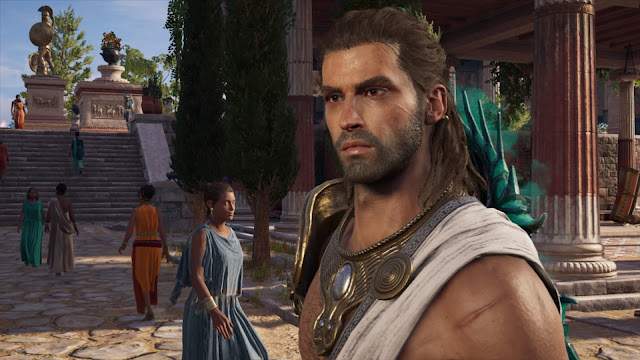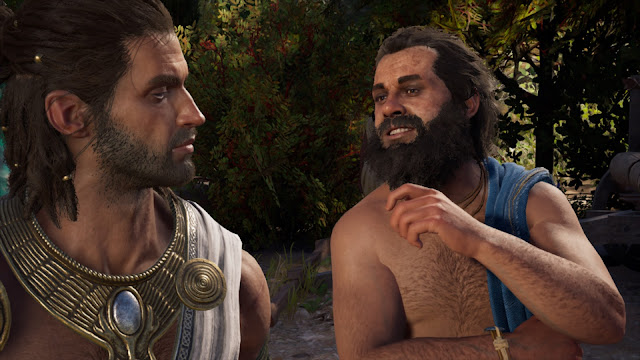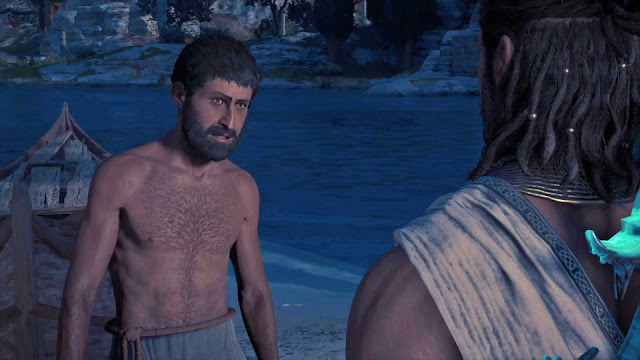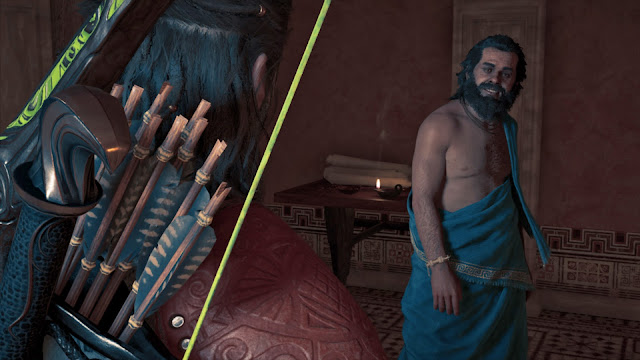Philosophy is a recurring subject that is explored extensively in Assassin's Creed Odyssey, as well as its eclectic relations with science and religion, all three being essential parts of not only the intellectual circles, but also everyday citizens in Ancient Greece. The protagonist of the game has the chance to meet several real-life philosophers, artists and thinkers of that time, as well as imaginary characters who also belong, directly or indirectly, to such groups and discuss with them issues related to various aspects of social, political, religious and artistic life.
Sokrates naturally has the lion's share in the philosophical part of the game, providing his sometimes cryptical input in situations where decisions make a critical difference and they may even have unpleasant outcomes. The essence of Sokrates's philosophy lies in self-awareness and perception as individual traits that a person should have and cultivate as means to understand and interpret the world around them. Sokrates doesn't really have any doubts - or, at least, expressing them openly is not his priority. He uses doubt as a vehicle in order to make people consider things and reach conclusions based on their own way of thinking. The first time that Alexios meets Sokrates is in Athens, where our hero had previously been sent by Perikles to rig a vote in order to change its outcome. Surprisingly enough, this action proves to not be in favor of the man who was being judged, because Perikles wanted his friend to be exiled in order to keep him away from imminent danger. Sokrates arrives to watch the announcement of the vote's result and poses us a series of questions about the limits of responsibility between the perpetrator and the abettor of an action. The interesting thing about Sokrates's dialectic method is that he never seems to agree with what Alexios replies to him, or that at least he finds new subjects for discussion with every answer that he gets. What he does in fact is that he tries to plant ideas in his conversator's mind, because, for him, ideas and thoughts are essential for the development of the person overall.
Later on, during Perikles's symposium, Alexios meets Sokrates again. This time, the philosopher brings about the subjects of leadership and justice, and aptly so since the setting is the villa of the city's leader. Sokrates wonders if ruling is an art, making Alexios - and us - consider to what extend real rulers and leaders are just in their decisions and whether their actions are for the benefit of the common good or they simply serve their own ambitions and personal plans.
At the same symposium, Alexios has a brief chat with the existentialist Protagoras. The sophist answers every question by doubting the existence of everything, wondering constantly whether what we see with our own eyes is truly there. Although the conversation with him naturally does not bring any fruit, since he seems to doubt the existence of everything and everyone around him, it still brings a very interesting issue into matter: our perception of things may not necessarily correspond fully to how things truly are. Each person has a unique way of seeing and perceiving everything around them, and this perception is the result of a series of experiences, thoughts, conclusions, activities that, for every person, form what we call "life experience". So two people may be looking at the same thing and still see something different.
Alexios comes across Sokrates again later, during specific quests, where critical decisions are connected with questions of morality. At some point, Alkibiades sends Alexios on a series of tasks in order to forge the name of a friend of his on the Athens citizenship list and make sure a witness will testify that said friend is indeed an Athenian citizen. It turns out that person is a traitor, and the question that arises is whether he deserves to become an Athenian citizen, albeit illegally. Sokrates is there of course, to wonder whether we should only judge people based on their past actions or we could offer them a second chance, posing a moral dilemma that cannot be easily or straightforwardly answered. Usually people never fully change, this is a trait of all living beings after all. In some cases, people who have done bad things in the past, eventually come to a point where they have their regrets, and this may lead them to change path in their life. But the contrary can also happen: a good person may become bad due to factors like circumstance or misfortune. For this reason, each case should be considered separately, and there is not a universal rule or strategy that can be applied to everyone.
While Alexios is on the hunt for an Athenian Cultist, who also happens to be a writer, Sokrates intervenes with a series of questions concerning freedom of speech and its potential limits. He wonders whether it is fair to shut people up, in cases where said people have extreme or dangerous opinions; a situation that cannot always have an easy or straightforward solution. Living in a state of Democracy, naturally the person in question has every right to express their opinion, no matter how ugly or threatening it may be. On the other hand, people with such extreme or dangerous opinions are usually enemies of Democracy, so the regime should, in theory at least, be protected somehow. Then again, if said enemies of Democracy are given the freedom to express themselves, their dangerous opinions are being made known to the public, therefore it is easier to keep an eye on them and take action against them if and when it becomes necessary. It is a matter than cannot be easily answered, and its handling depends on several other factors.
A bit later, another issue shows up, as Sokrates seems to have been somehow involved in the theft of a horse from the farm of a wealthy man. Apparently the philosopher learned about this matter and, digging deeper into it, found out that it was not one of a typical theft. The person who stole the horse was a poor farmer who had no means to support his family. He took a desperate decision and stole the horse from the rich man, intending to work with it and provide for his people. Subsequently, he was arrested. Sokrates poses a moral question to Alexios, concerning the degree to which the motive behind an action that is considered bad or illegal should or should not be taken into account when deciding about the culprit's fate. With this case as a starting point, Sokrates moves on to express more universal questions. Should every crime have consequences? And what about cases when a "crime" is for the benefit of the common good?
These questions are also connected to the next situation where Sokrates gets involved while Alexios is just about to locate one more Cultist, a ruthless slave owner. The "Master", as they call him, has tricked one of his slaves into believing that he is going to give him his freedom which the poor man has managed to buy by saving money. However when the time comes, the Master refuses to set the man free. When Alexios offers to help the slave by talking to the Master, the latter agrees to offer the slave his freedom if Alexios accepts to kill someone for him. At this point, Sokrates intervenes, essentially stressing the weight of the moral dilemma that rises for our hero, as he is called to decide upon the fate of a man by sacrificing another person's life. Sokrates sees this case as the perfect chance to discuss with Alexios about equality between people and its potential limits. The clue in this case, however, is that the moral dilemma in question is a fake one. The Master may be a wealthy man, and he may be the "owner" of the slave, but in fact he has no real influence over anyone because he is no position to exert power that goes beyond his domain. So he may be the slave's master, but he cannot really decide about the fate of people that do not "belong" to him, therefore he is in no position to blackmail Alexios in order to make him kill someone who is a free person and is not under his command. Moreover, the slave has already bought back his freedom, which makes the Master's refusal to set him free blatantly illegal.
In Achaia, Alexios meets Demokritos, whose philosophical questions are the most cryptic and complex, being also connected to physics and mathematics. Demokritos sends Alexios on a quest to find three theorems that, according to him, are essential for understanding how the universe works. The Golden Ratio, Zeno's paradox and the Pythagorean theorem may seem like they are much different on first look, but they all prove that everything around us is relative and that the universe is infinite.
In Korinth, Alexios meets a strange woman who sends him on a series
of quests, all of which have a fair share of philosophical extensions.
The woman shows up in a busy park and seems to know very well who
Alexios is and what his accomplishments are. There are several tasks
that Alexios is called to take, which start with investigating two
graves: the man buried in the first grave died at sea, while the other
was killed by lions. After Alexios comes back from the graveyard, the
woman asks him to decide which God is the most dangerous: Apollo or
Poseidon. Depending on our choice, Alexios then will visit two different
places and the stories of those involved will test
his faith in humanity and how well he can judge people's characters and
trust them. The questions that arise during these quests also have to do with how much people's actions affect each other and to what degree the so-called divine intervention can be blamed for the outcome of actions that, in fact, are human. Is revenge the right path for justice? Or humans in fact commit hubris when they take justice in their own hands?
On a less philosophical path, but still related is the story with the sculptor Polykleitos in Elis. Alexios comes across Polykleitos on his way to Olympia, and the sculptor invites him to a farm nearby where the residents have hired him to build for them a statue of the Eagle Bearer. Alexios becomes particularly curious since the matter is directly related to him and subsequently he gets acquainted with the people living in the farm, who all seem to have fallen in strange misfortunes. As it turns out, a cunning group of priestesses have taken advantage of Alexios's fame, and managed to convince this group of gullible farmers that the Eagle Bearer speaks through them. This way, they have made a small fortune by collecting valuable items and money from the people in the farm, supposedly to be offered as gifts to the Eagle Bearer. This story is connected to the previous one since it also explores the limits of faith, and additionally it goes beyond that, hinting at a case of mass manipulation. The farmers fell victims to their own faith, and let themselves be tricked by people who took advantage of this, which turned out to be their weak point. Lack of further and deeper thought was essentially what led these people to be so evilly manipulated, as they accepted the lies that the priestesses served them without questioning them. The exact opposite of Sokrates, that is, who questions and doubts everything.
And speaking of Sokrates, there is one more story with philosophical extensions where he not only makes an appearance, but he is also the protagonist. In Phokis, Alexios meets Sokrates's wife, Xanthippe, and the two of them find out that the philosopher had been arrested and imprisoned. Based on Sokrates's real story, this mission explores a series of themes that seem to have been of interest or related to him and his philosophical queries all along. Sokrates was imprisoned because he expressed an opinion that apparently was considered too radical. Meanwhile, the Pythia had told Socrates that he is the wisest man. This was done deliberately from her part, because, from the privileged position that she held, she wanted to open the people's eyes and stop them from being manipulated by the Cult. Since Sokrates, like all people, believed that she spoke the words of gods, she hoped that, because Sokrates did not think that he was indeed the wisest man, she would make him doubt her credibility and thus consider that maybe it was not the gods who directed her, and subsequently make the people realize that as well and stop blindly following her advice and, eventually, the words of the Cult.
On his quest to set Sokrates free, Alexios goes to a symposium in Delphi where he succeeds in convincing a few other philosophers to support Sokrates's right to freely express his opinion, even if they themselves disagree with him. Therefore freedom of speech comes to the foreground again, as one of the most important values in social life, being also one of the first matters that Sokrates posed to Alexios during their initial meetings. In the conclusion of this story, Sokrates narrates a myth to Alexios which is an allegory for the freedom of speech and the need for people to speak for themselves and not through the words and quotes of others. Something that Philosophy, in its essence, values as equally important as well.
















No comments:
Post a Comment